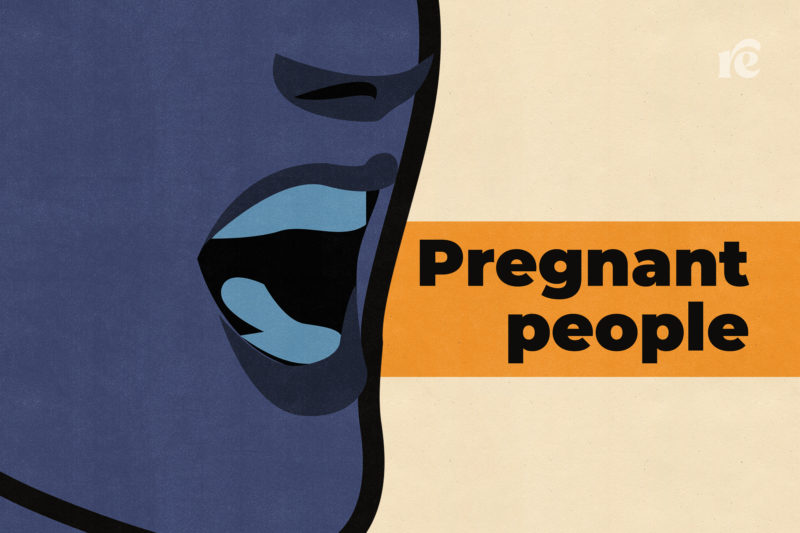Saying ‘Pregnant People’ Is Even More Critical Post-‘Roe’
You can center women of color without erasing trans people. And it's totally easy.

As we collectively grieve the anticipated yet no less heartbreaking fall of Roe v. Wade, the finger-pointing has ramped up. One argument that keeps resurfacing is that use of the gender inclusive term “pregnant people” has erased women and thus weakened our fight for reproductive freedom.
Just one day before the Supreme Court overturned Roe in June, Ms. Magazine published an article in which the authors write that the term “pregnant people” not only erases (cisgender) women, it’s also akin to “colorblind” language around race and hinders our fight for abortion access:
Just as a race-neutral framing of policing or gentrification does not address the inherent racism of these systems, a sex-neutral framing of pregnancy and abortion does not address the sexism and misogyny of abortion bans.
One of the main points of the article is that using “pregnant people” especially erases Black women (assumed but not stated to be cisgender), who as we know are disproportionately likely to be affected by the overturning of Roe and the health, social, and economic consequences that will ensue.
This is a classic move by white, cis women who want to be seen as good “allies” to women of color that fails miserably. The vast majority of reproductive justice organizations, abortion funds, and practical support networks—many of them led by Black women and/or nonbinary, queer, and trans folks of color—have shifted to including the term “pregnant people.” Movement leaders have called for more inclusive language. With abortion access about to be outlawed in about half of the country, it’s time to get on board the inclusive language train; we have a lot of work to do.
Inclusive language is easy
The idea that inclusive language erases women and hurts our movement has a few holes.
As the Ms. article argues, is the notion that “pregnant people” is inaccurate and thus not useful because (cis) women are the vast majority of people who have abortions. Although it is reasonable to assume that (cis) women comprise the majority of people having abortions, we don’t actually know how many trans and nonbinary people have abortions in a given year because there is no systematic data collection. Any estimates are certainly underestimates, because clinics do not routinely collect data on gender identity. And what we do know is that the overturn of Roe will disproportionately harm trans and nonbinary people, who already face numerous barriers to reproductive health care.
And besides, the argument that there’s numerically few of them so they don’t need to be included or centered has big “we don’t need a student of color group because it’s a predominately white campus” energy.
Not a zero-sum game
Inclusive language doesn’t erase the importance of gender and race in the fight for reproductive freedom. The Ms. Magazine authors seem to have missed the fact that no one in the movement is saying that gender doesn’t matter. They argue that using inclusive language is a zero-sum game, whereby including some people necessarily excludes others. I agree that we should not erase women—and women of color in particular—but that doesn’t have to come at the expense of trans inclusion.
As UC Berkeley School of Law professor Khiara Bridges put it in her recent testimony during a U.S. Senate hearing on abortion access:
We can recognize that this impacts women while also recognizing that it impacts other groups. Those things are not mutually exclusive.
What’s more, criminalizing abortion and criminalizing trans health care are part of the same racist, misogynistic strategy to limit bodily autonomy. And, to state the horribly obvious, trans women are women, and while they don’t need abortion access, their access to health care is affected by the same sexist, racist, and classist systems that harm cisgender women.
There are ways to acknowledge how cis women of color are disproportionately harmed by abortion bans without erasing trans folks. Take Kimberlé Crenshaw (who coined the term intersectionality) and Rewire News Group’s Imani Gandy.
In a statement on bodily autonomy from the African American Policy Forum immediately after the Dobbs v. Jackson Women’s Health Organization decision came down, Crenshaw, the organization’s director, writes that “the consequence of our society’s failure to see coerced pregnancy as a legacy of enslavement has descended once again upon Black women and all pregnant people with lethal force.”
And in the June 24 episode of Boom! Lawyered, Gandy clapped back at how the decision tried to conflate abortion with enslavement and anti-Blackness. She noted the hypocrisy of calling Black people “participators in our own genocide and comparing Roe v. Wade, which gave Black pregnant women and Black pregnant people autonomy, comparing that to a time period where we were raped and brutalized so that we could continue to produce children that would spark the engine of this economy.”
Notice how they both centered Black women and included trans folks?
I recognize that not all trans people are on board with the language of “women and pregnant people.” I get that. It puts trans people second and implicitly assumes all women are cisgender. What I can’t get down with is how white cis women are doubling down on using trans-exclusionary language and arguing that doing so is somehow an anti-racist strategy.
Quite the opposite, actually. Ignoring the cis women of color and nonbinary and trans folks of color calling for inclusive language actively contributes to the misogynistic, white supremacist nonsense that led to Roe being overturned in the first place. Using “pregnant people” is a solidarity term—it doesn’t weaken our movements, it strengthens them. Now more than ever, it is especially crucial to follow our movement leaders who have been doing this work forever and are going to keep on doing it in our post-Roe hellscape.

